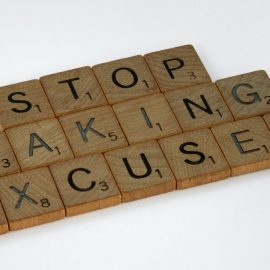
Why do humans consistently overestimate their abilities and importance? What mental shortcuts lead us to make unfair judgments about others while maintaining an inflated view of ourselves?
In You Are Not So Smart, David McRaney explores the fascinating psychological phenomena that can cause you to think too highly of yourself. From confirmation bias to the spotlight effect, he reveals how your brain can create an unrealistic self-image while simultaneously oversimplifying your view of others.
Keep reading to discover four common thought errors that affect your daily decisions and relationships—and learn practical strategies to overcome them.
Why You Think Too Highly of Yourself
McRaney contends that our brains tend to overestimate our competence and importance while underestimating and oversimplifying others’ competence and importance. In other words, we think we’re better at things than we are, place ourselves at the center of situations that aren’t about us, and see ourselves as complex and nuanced individuals while denying others these considerations. We’ll discuss how four thought errors can cause you to think too highly of yourself.
Thought Error 1: You Believe Your Judgments Are Rational
McRaney explains that we tend to think that our judgments are always rational and based on logic and that we’ll change our minds when new evidence presents itself; however, we tend to form beliefs without much critical thought and cling to those beliefs without ever questioning their validity. This can be seen in psychological phenomena such as confirmation bias, where we seek out and interpret new information to support our beliefs, and brand loyalty, where we remain loyal to certain brands out of familiarity rather than practicality.
For example, you notice the commercial saying your preferred brand has the cleanest water, but ignore the article about how it has an acidic pH that’s bad for you. Further, you continue buying this brand even when there are cheaper options—not because it’s better, but because you have an emotional attachment to it—especially if you’ve spent a significant amount of money on it.
(Shortform note: It’s important to understand these phenomena as weaknesses because entities such as marketing agencies often use them against you. Brands often utilize confirmation bias to get you attached to their product and brand loyalty to keep you attached. For example, some brands use stereotypes in their ads that will make you think they’re higher quality than they are—a shampoo that says “made in Morocco” seems better than one made in the US because we think foreign products are fancier. This takes advantage of confirmation bias. Then, once you’re loyal to the brand based on its perceived high quality, they can lower the quality and increase the price so that you’re paying more and they’re paying less.)
This phenomenon is detrimental because it can lead you to defend invalid points, get into silly arguments, and maintain unproductive habits and beliefs—for example, you could save hundreds of dollars a year by getting store-brand water instead of your preferred brand. To overcome this thought error, McRaney recommends regularly questioning your beliefs and habits and seeking out counterarguments so you can gain a well-rounded perspective before making judgments.
| How to Identify and Overcome Faulty Judgments In Thinking in Bets, Annie Duke provides more suggestions to help you identify which beliefs might be faulty due to confirmation bias. She recommends identifying the beliefs you should question by imagining that you have to place a bet on all your beliefs. Once money is at stake, you’re more likely to realize which of your beliefs may be faulty. In Think Like a Rocket Scientist, Ozan Varol offers other advice on how to question your beliefs, as McRaney recommends. Aside from seeking out counterarguments, you should also test your beliefs under real-life conditions, and use more than one method of testing. For example, to test whether your brand of water bottle is the best, gather a few different brands from the store you normally buy from (ensuring the samples are collected under real-life conditions). Then, test the acidity of the water with two methods—pH test strips and litmus paper. |
Thought Error 2: You Overestimate Your Intelligence and Skill Level
According to McRaney, we tend to overestimate our skill, intelligence, and success—and when we learn that we were wrong about something, we convince ourselves that we knew that information all along. This can be seen in psychological phenomena such as hindsight bias, where we convince ourselves we knew new information all along, the Dunning-Kruger effect, where we overestimate our abilities in areas where we lack skill, and the self-serving bias, where we see ourselves in an overly positive light to boost our ego. For example, you think that a task will be easier to complete than it is, that you’ll score higher on an exam than you will, and that you were more successful in the past than you really were.
This kind of thought error happens for a few reasons. First, McRaney explains that overestimating ourselves is a natural human tendency. Further, we convince ourselves that we already know new information rather than admitting we were wrong because we crave consistency (we don’t want to change our mental framework by admitting we were wrong) and want to maintain high self-esteem. This also explains why we judge our past to be more successful than it actually was.
| Social Comparison and the Exception to Our Tendency to Inflate Ourselves Humans generally tend to overestimate themselves, but this isn’t universally true. Many people defy this tendency by regularly underestimating themselves, and this deviation can be explained through social comparison theory. There are two types of social comparison—upward and downward. When comparing downward, you compare yourself to someone you think you’re better than, which makes it easy to overestimate your abilities as McRaney notes. However, if you compare upward to people who are more successful than you are, you’re likely to diverge from this rule and have low self-esteem. You may then doubt and underestimate yourself, believing you’re less capable and successful than others. Researchers explain that whether these comparisons boost or diminish our egos depends on how much control we feel we have over our circumstances. For example, if we upwardly compare ourselves in an area we think we can improve in, it will motivate us to do better. If we upwardly compare ourselves but don’t feel we can improve, we’ll experience low self-esteem and self-doubt. |
These phenomena are detrimental because they hinder your potential for growth and success—if you think you’re already good enough, there’s no room for improvement. To overcome this thought error, McRaney recommends adopting a mindset of constant growth where you can identify shortcomings and areas for improvement. Something you can do to help with this is compare yourself to experts—this will give you metrics to strive for.
(Shortform note: The authors of Make it Stick offer some additional advice you can follow to help you stop overestimating yourself and start improving. For example, don’t just compare yourself with experts— obtain mentorship and training from them. This helps you accurately gauge your skill level compared to theirs. You can also work alongside a team or partner so you have encouragement and an outside perspective of your progress.)
Thought Error 3: You Crave Importance
McRaney explains that, instead of using logic, we often make assumptions and decisions based on our perceptions of self-importance. There are two ways we do this: First, we believe ourselves to be the center of attention. Second, we make decisions in order to protect our ego—our sense of self-importance.
We Think We’re The Center of Attention
McRaney explains that we have outsized views of our importance because of human nature—we’re the center of our own universe, so we believe ourselves to be more important to others than we actually are. This phenomenon is called the spotlight effect. For example, you’re likely to think those around will notice the small stain on your shirt or your bad mood. In reality, people are unlikely to notice you, let alone the stain or your mood—they’re focused on themselves, just as you’re focused on you.
According to McRaney, this self-centered thinking causes unnecessary stress about being judged and prevents you from paying attention to your environment. For example, you spend the night feeling bad about the stain that no one notices when you could be having fun. Likewise, your focus on the stain prevents you from noticing things such as how happy your friends are to see you—something you should be grateful for. McRaney suggests that when you start to feel self-conscious about others’ opinions of you, remember that strangers are paying about as much attention to you as you are to them—you’re too busy thinking about yourself to think about them, and so are they.
We Strive to Protect Our Ego
McRaney explains that our desire to protect our ego—our sense of self-importance—often causes us to make poor choices. We tend to base our decisions on how important the result will make us feel rather than practicality. This phenomenon is called the ultimatum game. For example, if you go to a new restaurant and your waiter offers you a voucher for a free drink upon your next visit, you’re happy and will return. If you’re a long-time customer and receive the same offer, you might see this as insulting—it’s not much compared to the amount of money you’ve spent there so you don’t return due to this perceived slight. Logically, a free drink is better than a drink at cost, but your sense of importance drives you to reject it.
McRaney explains that we engage in this thought error because it’s our nature to want to gain status—in tribal times, our survival hinged on our resources and status in the group. However, it’s detrimental in modern times because it causes us to miss out on opportunities. To overcome ego-serving thinking and make more practical decisions, McRaney suggests logically evaluating the pros and cons of your opportunities.
Thought Error 4: You Doubt Others Unfairly
Finally, McRaney explains that, despite overestimating ourselves, we underestimate others. This can be seen in psychological phenomena such the third person effect (we see others as more gullible than we are), the representativeness heuristic (we make generalizations and character judgments based on simple facts we know about a person), and the fundamental attribution error (we believe that a person’s actions fundamentally reflect their character although we tend to make excuses for our own actions that preserve our character).
McRaney explains that we fall prey to these thought errors because they’re mental shortcuts that allow us to make quick judgments and decisions that help us understand and navigate our world safely. For example, if someone yelled at you once, you assume they’re a mean person and avoid them to protect yourself. However, people are more complex than this. You can see this in yourself—raising your voice one day when you’re upset doesn’t mean you’re a cruel person.
These thought errors can be detrimental for numerous reasons. For example, they can lead to prejudice and make you underestimate and therefore deny opportunities to others. The misunderstandings you have as a result of these errors can also damage relationships. To avoid this, McRaney suggests refraining from making snap judgments about people—consider what you don’t know and what you need to learn to make an accurate judgment. Further, don’t censor people based on what you think they’re capable of; instead, give people the opportunity to make judgments and decisions based on their own rationale.






